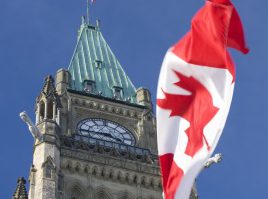
[ad_1]
The economic implications of COVID-19 have led many start-up and
growth-stage companies to face tough decisions. The federal and
provincial governments have introduced new programs and amended
existing ones to assist businesses and mitigate the effects of the
pandemic on companies and their employees. This bulletin highlights
several programs that may be useful to our Nitro clients, with a
focus on federal and Ontario governmental supports.
The information set out below is current as of April 14,
2020.
CANADA EMERGENCY WAGE SUBSIDY (CEWS)
On April 11, 2020, the federal government passed legislation
enacting an emergency wage subsidy of up to 75 per cent for
qualifying businesses. The CEWS is designed to discourage
businesses from laying off employees in response to COVID-19. If
eligible, businesses would qualify for the CEWS for up to 12 weeks
from March 15 to June 6, 2020. The program is being implemented
through technical changes to the Income Tax Act.
Businesses looking to determine their eligibility for the CEWS
should consult with their tax and accounting advisors.
Further details on the CEWS, please see our April 2020
Blakes Bulletin: Parliament Enacts the Canada Emergency Wage
Subsidy.
How to Apply
Eligible employers will be able to apply for the CEWS through
the Canada Revenue Agency’s My Business Account
portal. Employers will need to keep records demonstrating their
reduction in revenues and remuneration paid to employees. More
details about the application process will be made available
shortly.
Temporary Wage Subsidy for Employers
The CEWS does not replace the Temporary Wage Subsidy, a
three-month initiative that provides eligible employers with 10 per
cent of the remuneration that it pays from March 18 to June 19,
2020, up to a maximum of C$25,000 per employer.
Individuals, partnerships, non-profits, registered charities and
Canadian-controlled private corporations that are eligible for the
small business deduction may be eligible for the Temporary Wage
Subsidy. To be eligible, such employers must have an existing
business number and payroll program with the Canada Revenue Agency
(CRA) as of March 18, 2020 and pay salary, wages, bonuses or other
remuneration to an employee who is employed in Canada.
Eligible employers do not need to apply for the Temporary Wage
Subsidy. It is calculated when an eligible employer remits required
deductions to the CRA.
BUSINESS CREDIT AVAILABILITY PROGRAM (BCAP)
On March 13, 2020, the federal government announced the new
BCAP. BCAP will support access to financing for Canadian businesses
across all sectors and in all regions. The federal government will
provide more than C$65-billion of additional support through the
Business Development Bank of Canada (BDC) and Export Development
Canada (EDC).
Eligibility
Any credit-worthy business with a viable business model whose
activities fall within either the BDC or EDC mandate is eligible
for BCAP.
How to Apply
The financial institutions with whom businesses have a
pre-existing relationship are best situated to assess and deal with
a client’s specific needs and requests. If a client’s needs
exceed the level of support that the financial institution can
provide, the financial institution will work alongside the BDC or
EDC to access additional resources made available by the federal
government.
CANADA EMERGENCY BUSINESS ACCOUNT (CEBA)
On April 9, 2020, banks officially opened applications for the
CEBA. The C$25-billion program, implemented by the EDC, will
provide eligible small businesses and not-for-profits with
interest-free loans of up to C$40,000. The Canada Emergency
Business Account will help cover operating costs at a time where
revenues have been temporarily reduced due to the economic impacts
of COVID-19. The CEBA is intended to ensure that small businesses
can access the capital they need during these tough economic
times.
Eligibility
Small businesses and not-for-profits need to demonstrate that
they paid between C$50,000 to C$1-million in total payroll in 2019
(shown on their T4 summary).
How to Apply
To apply for the CEBA, small businesses and not-for-profits
should contact their financial institution.
BDC CAPITAL BRIDGE FINANCING PROGRAM
BDC Capital, BDC’s investment arm, has launched the BDC
Capital Bridge Financing Program. Where a current financing round
is being raised through qualified existing and/or new investors
into eligible start-ups, BDC will match the financing round with a
convertible note.
Eligibility
To be eligible, companies must be Canadian, backed by a
qualified venture capital firm, have raised at least C$500,000 in
external capital before applying for the program and be
specifically impacted by COVID-19. Any matching investment by BDC
Capital will be further subject to, notably, satisfactory due
diligence review by BDC, agreement on terms of the investment and
approval by a BDC investment committee.
This is not limited to BDC’s portfolio. All companies that
meet the criteria are eligible to apply. Interested companies
should speak to their lead investor for details.
The details of which venture capital firms will be eligible or
how firms will be selected has not been released at this time.
However, venture capital firms looking to participate can contact
BDC Capital to discuss their eligibility.
SCIENTIFIC RESEARCH AND EXPERIMENTAL DEVELOPMENT (SR&ED)
PROGRAM
The Scientific Research and Experimental Development (SR&ED)
Program uses tax incentives to encourage Canadian businesses to
conduct research and development in Canada. On March 18, 2020, the
CRA announced a suspension of non-critical functions, including
most business auditing, for four weeks as part of its operational
response to COVID-19. We understand that the CRA has since expanded
its list of critical operations and is working to bring its
auditors online to work from home for an indeterminate time. As a
result, businesses scheduled to be audited during the audit
suspension may experience delays in receiving money from the
SR&ED Program, as recent reports have suggested. These likely
delays could intensify the economic impacts of COVID-19. Businesses
should prepare for such delays and make use of other government
supports, if possible, or have contingency plans in place.
CANADA EMERGENCY RESPONSE BENEFIT (CERB)
In the event your employees or contractors have stopped working
because of COVID-19 and do not qualify for traditional benefits
(i.e., Employment Insurance), the CERB program may provide them
with temporary income support of C$500 a week for up to 16
weeks.
Eligibility
The benefit will be available to workers:
-
Residing in Canada, who are at least 15 years old
-
Who have stopped working because of COVID-19 and have not
voluntarily quit their job or are eligible for EI regular or
sickness benefits -
Who had income of at least C$5,000 in 2019 or the 12 months
prior to the date of their application -
Who are or expect to be without employment or self-employment
income for at least 14 consecutive days in the initial four-week
period, and who, for subsequent benefit periods, expect to have no
employment or self-employment income
How to Apply
Eligible contractors or self-employed individuals can apply here.
WORK-SHARING
Work-Sharing (WS) is a program designed to help employers and
employees avoid layoffs when there is a temporary decrease in an
employer’s business activity beyond its control. Employees,
employers and Service Canada enter into a three-way agreement where
Service Canada pays employment insurance to employees that agree to
work reduced hours during a temporary decrease in an employer’s
business beyond the employer’s control.
Effective March 15, 2020, the federal government introduced Temporary Special Measures for COVID-19
(Temporary Special Measures), which extend the eligibility of such
agreements to 76 weeks, ease eligibility requirements and
streamline the application process.
Eligibility
Employers
To be eligible, employers must satisfy the following
requirements:
-
Be a year-round business in Canada for at least one year
-
Be a private business, publicly held company or non-for-profit
organization -
Have at least two employees in a WS unit
Employers are not eligible for WS if the reduction in business
activities is due to:
-
A labour dispute
-
A seasonal shortage of work
-
A pre-existing and/or recurring production slowdown
-
A recent increase in the size of the workforce
Employees
To be eligible, employees must:
-
Be year-round, permanent, full-time or part-time employees
needed to carry out the day-to-day functions of the business (your
“core staff”) -
Be eligible to receive EI benefits
-
Agree to reduce their normal working hours by the same
percentage and share the available work
The following employees are not eligible for WS:
-
Seasonal employees and students hired for the summer or a coop
term -
Employees hired on a casual or on-call basis or through a
temporary help agency -
Employees who hold more than 40 per cent of the voting shares in
the business
Under the Temporary Special Measures, employees who are needed
to help generate work and/or are essential to the recovery of the
businesses (i.e., senior management, executive-level
marketing/sales agents, technical employees engaged in product
development, etc.) will be eligible for WS.
How to Apply
Employers need to submit two forms 10 calendar days prior to the
requested WS start date: Applications for a Work-Sharing Agreement form
EMP5100 and Attachment A: Work-Sharing Unit form
(EMP5101). In Ontario, employers should send the application
materials to ESDC.ON.WS-TP.ON.EDSC@servicecanada.gc.ca.
OTHER PROGRAMS
Economic Support and Recovery for Businesses
The City of Toronto has established the Mayor’s Economic
Support and Recovery Task Force, which is focused on quickly
determining what supports and stimulus work needs to be done in
response to COVID-19. The City of Toronto has launched immediate
actions that include establishing a contingency fund to support
businesses and expanding the city’s small business advisory
services to help small businesses as they plan to recover from the
impacts of COVID-19.
The COVID-19 Challenges Procurement Program
The COVID-19 Challenges Procurement Program is designed to
provide small and medium-sized businesses (fewer than 500 staff)
with financial support from the National Research Council of Canada
Industrial Research Assistance Program (NRC IRAP). The financial
support provided from the NRC IRAP is intended to allow eligible
businesses to refine and sell a product or solution that is
designed to meet a COVID-19 related need.
Over the next few weeks, the NRC IRAP will partner with
Innovative Solutions Canada to launch calls for proposals to
address challenges, fund development of solutions, and buy
successful products and services that are needed to address
COVID-19.
Small and medium-sized businesses with promising technology
designed to meet a COVID-19 need can register their technology or
product here.
For permission to reprint articles, please contact the
Blakes Marketing Department.
© 2020 Blake, Cassels & Graydon LLP.
The content of this article is intended to provide a general
guide to the subject matter. Specialist advice should be sought
about your specific circumstances.
[ad_2]
Source link
Share This Story, Choose Your Platform!
Related Posts
Recent Posts
- The government grant landscape is changing; how does IT fit in?
- The government wants CATA’s advice on how to improve SR&ED funding
- Impact of COVID-19 on the SR&ED Tax Credit
- Everything you must know about scientific research and experimental growth
- As Liberals tout ‘innovation agenda,’ CRA keeps scaling back SR&ED credits: CATA


